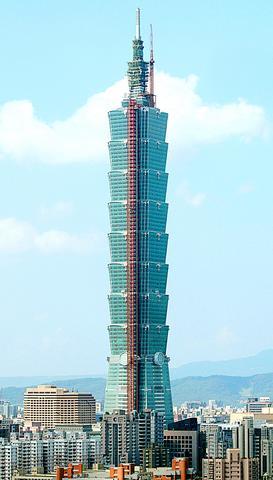The Taipei 101 office building laid claim to the title of the world's tallest skyscraper following a ceremony yesterday to position a 60m spire on top of the structure.
With the addition of the spire, the building boasts of a full height of 508m, eclipsing Malaysia's Petronas Twin Towers, a company executive said yesterday.
"We believe that Taipei 101 will bring a fresh taste to Taipei's skyline," said Lin Hong-ming (

PHOTO: REUTERS
Lin hopes the landmark, though still under construction, will attract more tenants in the Hsinyi district.
Though the leasing of office space is still in its initial stages, Lin expects about 80 percent of the 60,000 ping at Taipei 101 will be leased within 18 months.
"What concerns our potential tenants is how to earn more money after moving into Taipei 101 [with around-the-clock services] rather than saving money through lower rentals," Lin said.
Jones Lang LaSalle Taiwan, the primary leasing agent for the Taipei 101 tower, is not sure about the leasing prospects, however.
"We're seeking the right price and right tenants, who will have long-term occupancies. We're not in a rush," Matthew Shaw, director of Jones Lang LaSalle Taiwan, told the Taipei Times.
Property-market watchers said that slow corporate spending, a lukewarm office market, an increasing supply of office space and high rental rates charged by the Taipei Financial Center could dash the company's hopes.
"Eighty-percent occupancy is an aggressive target. I doubt many potential tenants are available now as big international companies such as Hewlett-Packard Co and IBM Corp just signed new lease contracts for new offices in the area," said Derek Huang (
Though Taiwan's economy is showing signs of recovery, the resilience has not extended to the office market, Huang added.
Carol Su (
For the moment, corporate CEOs are unlikely to rent luxury offices, Su said.
Another factor that could slow Taipei 101's leasing progress is the impact of the Sept. 11, 2001, attack on the twin towers in New York. Su said the attacks appear to have dampened multinational corporations' interest in skyscrapers.
A growing supply of office space in the Neihu and Nankang districts also put the leasing plan in trouble as those offices are attractive to companies looking for lower rental rates, Huang said.
Rents are about NT$1,100 per ping per month and NT$600 per ping per month in the Neihu and Nankang areas, respectively, according to Huang.
The rents will range from NT$3,000 to NT$4,000 per ping for tenants of Taipei 101, an official at the Taiwan Stock Exchange, one of the skyscraper's major shareholders and future tenants, said last month.

AGING: As of last month, people aged 65 or older accounted for 20.06 percent of the total population and the number of couples who got married fell by 18,685 from 2024 Taiwan has surpassed South Korea as the country least willing to have children, with an annual crude birthrate of 4.62 per 1,000 people, Ministry of the Interior data showed yesterday. The nation was previously ranked the second-lowest country in terms of total fertility rate, or the average number of children a woman has in her lifetime. However, South Korea’s fertility rate began to recover from 2023, with total fertility rate rising from 0.72 and estimated to reach 0.82 to 0.85 by last year, and the crude birthrate projected at 6.7 per 1,000 people. Japan’s crude birthrate was projected to fall below six,

Conflict with Taiwan could leave China with “massive economic disruption, catastrophic military losses, significant social unrest, and devastating sanctions,” a US think tank said in a report released on Monday. The German Marshall Fund released a report titled If China Attacks Taiwan: The Consequences for China of “Minor Conflict” and “Major War” Scenarios. The report details the “massive” economic, military, social and international costs to China in the event of a minor conflict or major war with Taiwan, estimating that the Chinese People’s Liberation Army (PLA) could sustain losses of more than half of its active-duty ground forces, including 100,000 troops. Understanding Chinese

US President Donald Trump in an interview with the New York Times published on Thursday said that “it’s up to” Chinese President Xi Jinping (習近平) what China does on Taiwan, but that he would be “very unhappy” with a change in the “status quo.” “He [Xi] considers it to be a part of China, and that’s up to him what he’s going to be doing, but I’ve expressed to him that I would be very unhappy if he did that, and I don’t think he’ll do that. I hope he doesn’t do that,” Trump said. Trump made the comments in the context

SELF-DEFENSE: Tokyo has accelerated its spending goal and its defense minister said the nation needs to discuss whether it should develop nuclear-powered submarines China is ramping up objections to what it sees as Japan’s desire to acquire nuclear weapons, despite Tokyo’s longstanding renunciation of such arms, deepening another fissure in the two neighbors’ increasingly tense ties. In what appears to be a concerted effort, China’s foreign and defense ministries issued statements on Thursday condemning alleged remilitarism efforts by Tokyo. The remarks came as two of the country’s top think tanks jointly issued a 29-page report framing actions by “right-wing forces” in Japan as posing a “serious threat” to world peace. While that report did not define “right-wing forces,” the Chinese Ministry of Foreign Affairs was